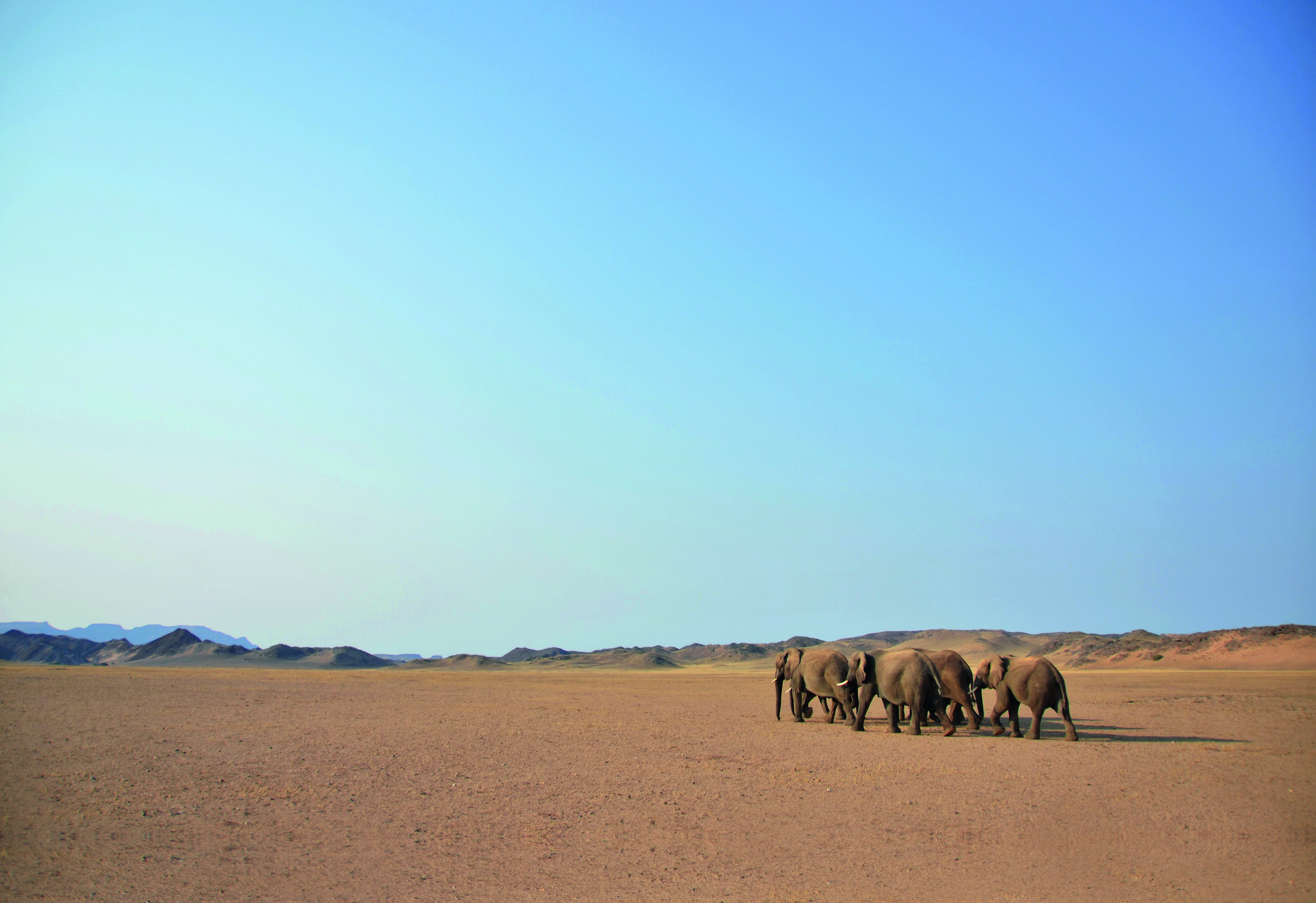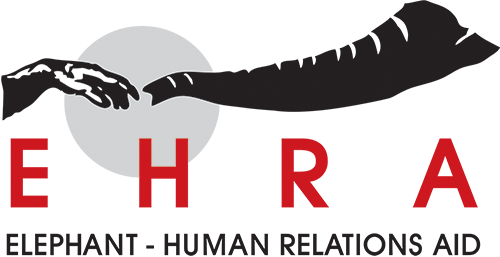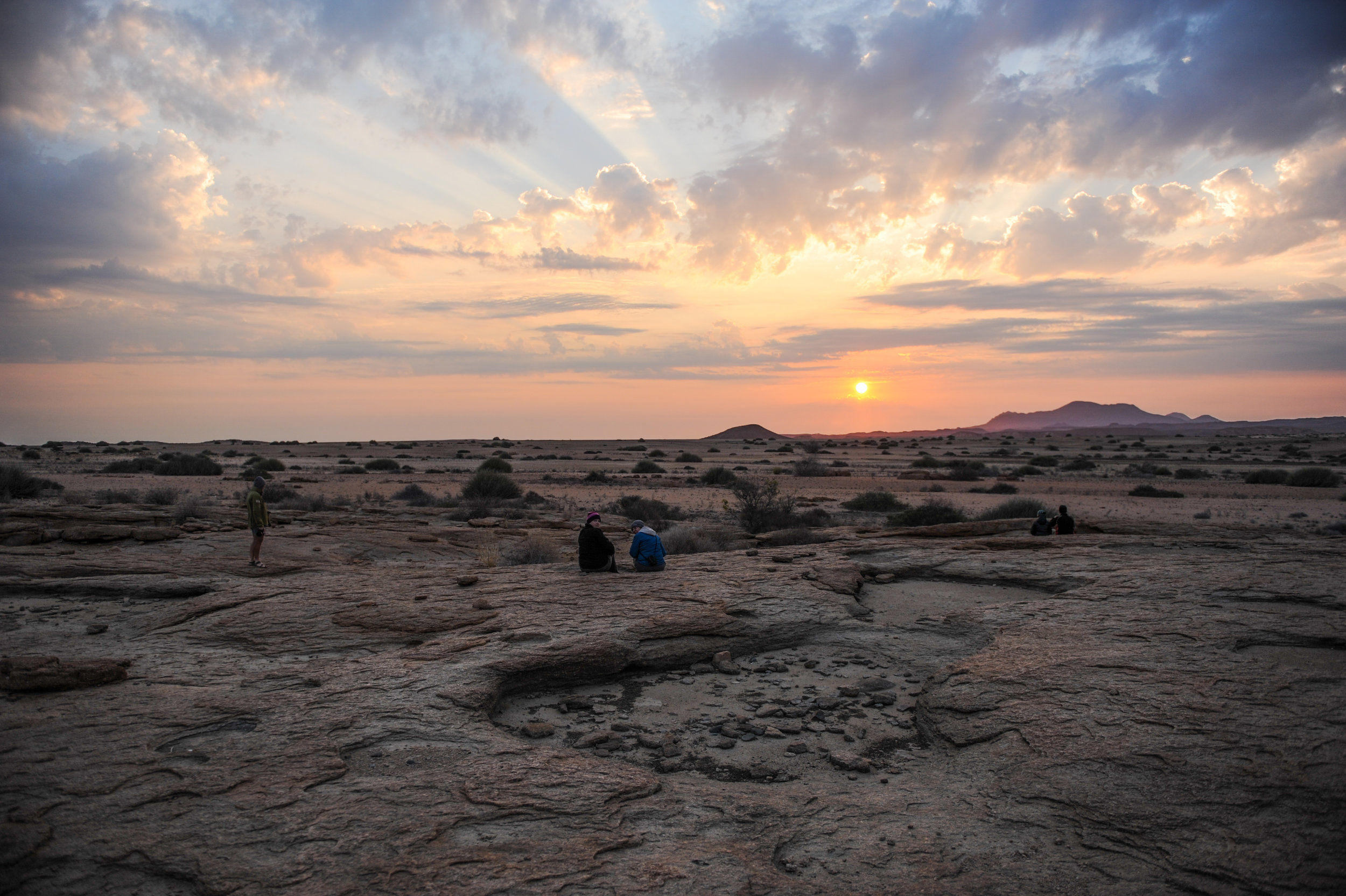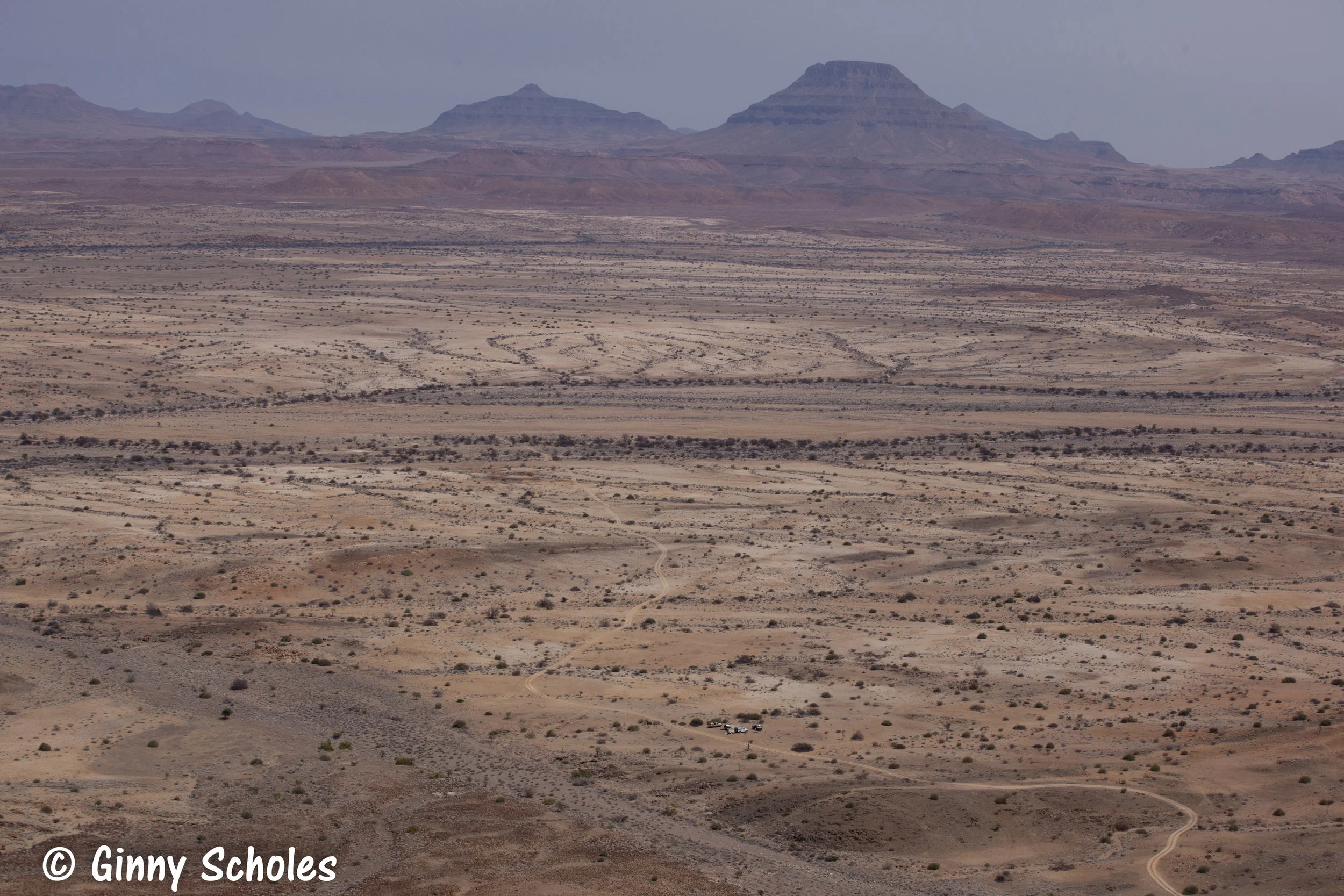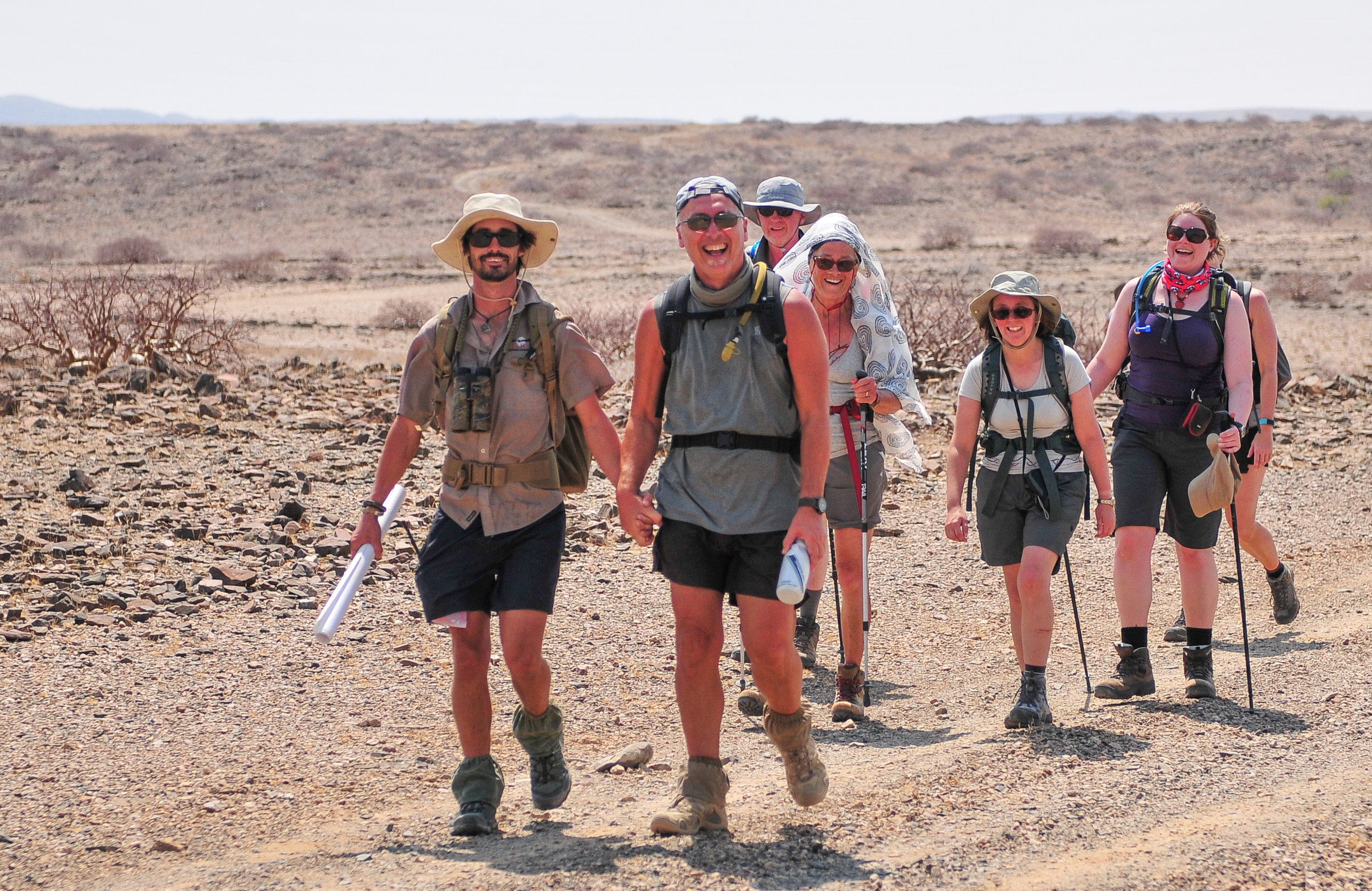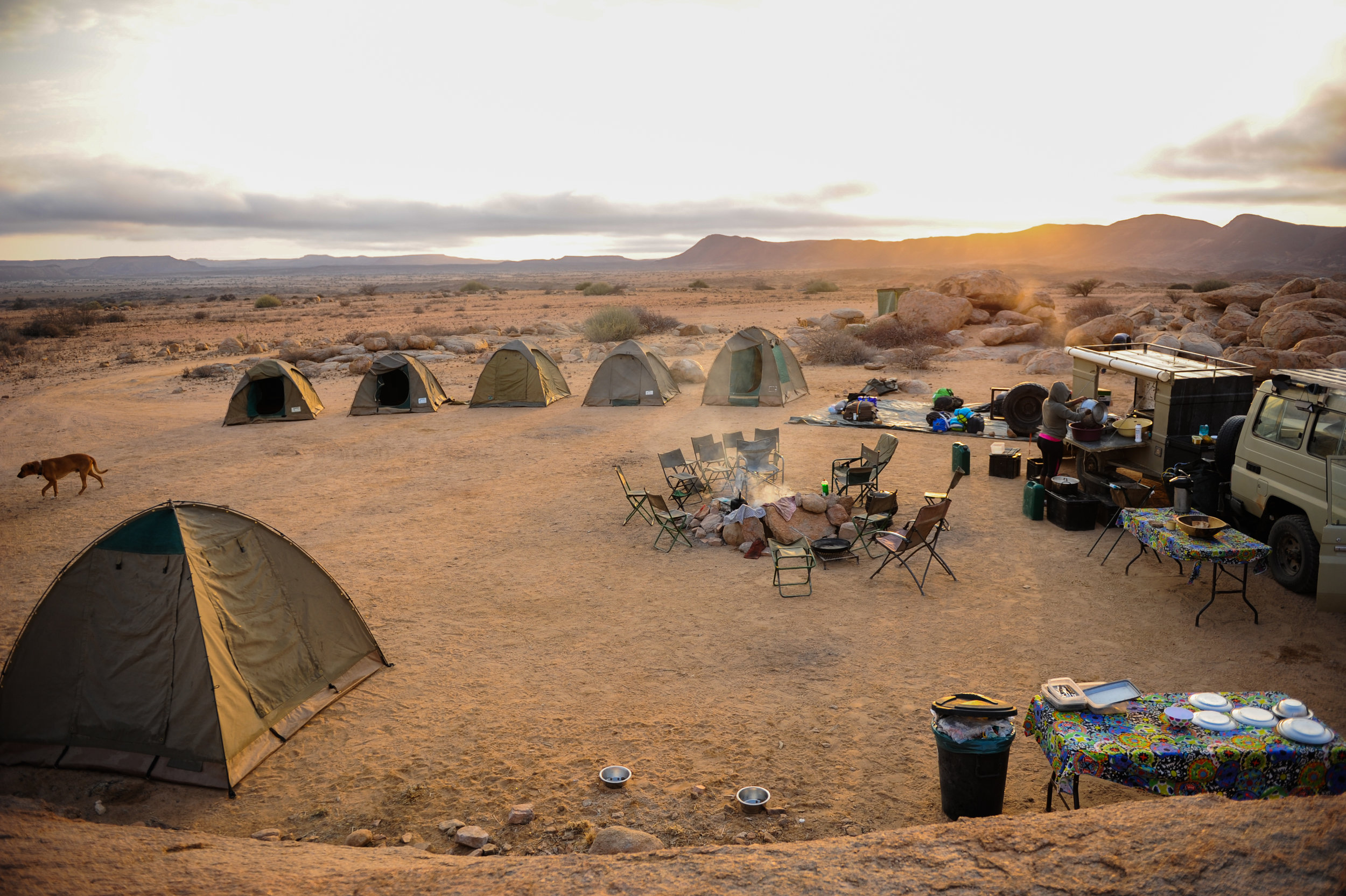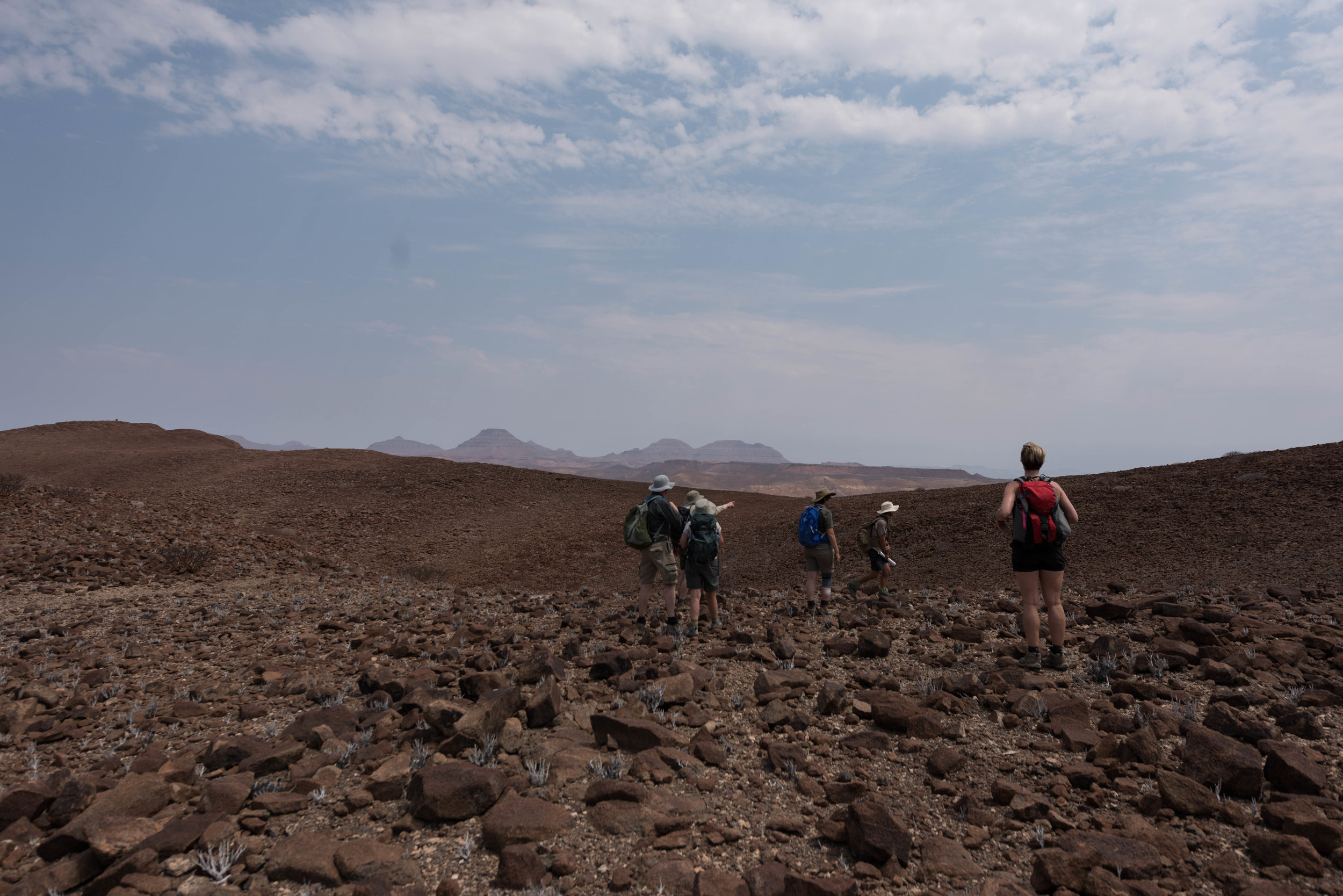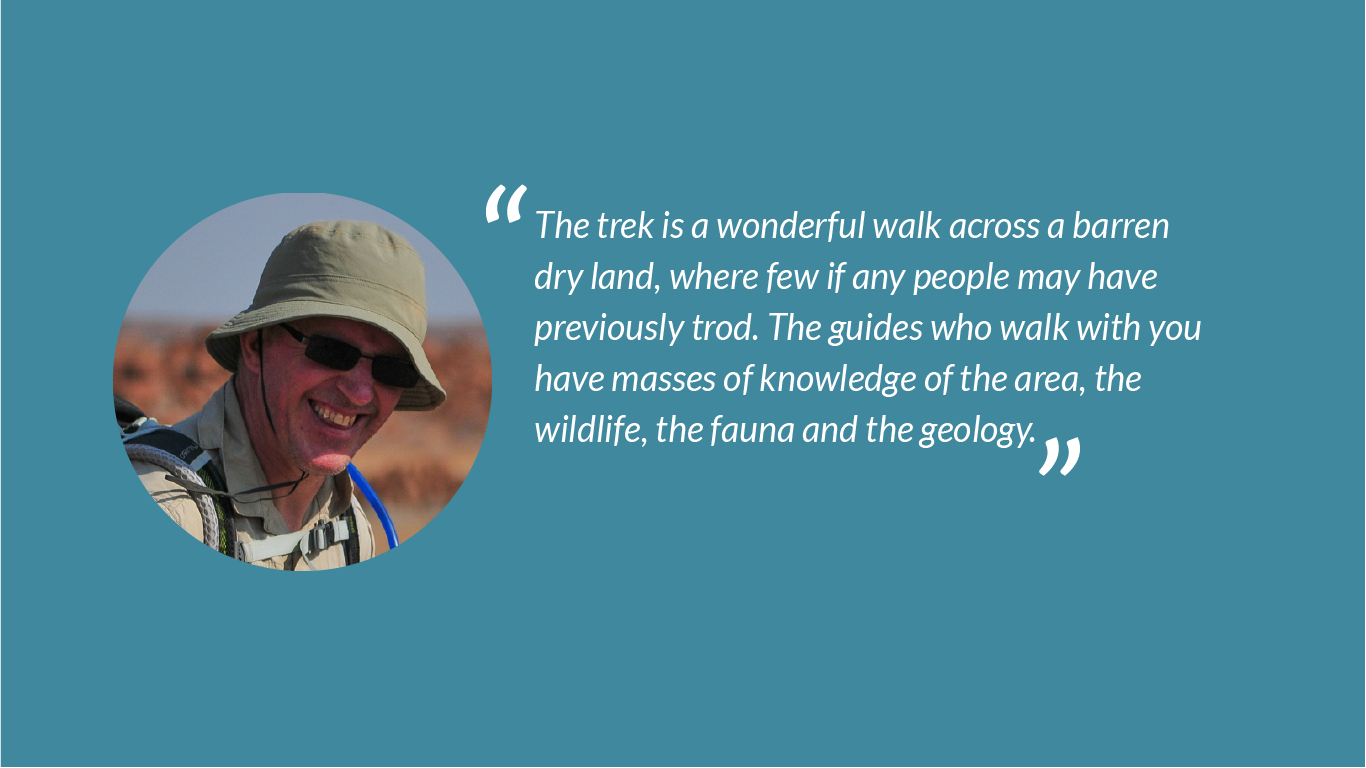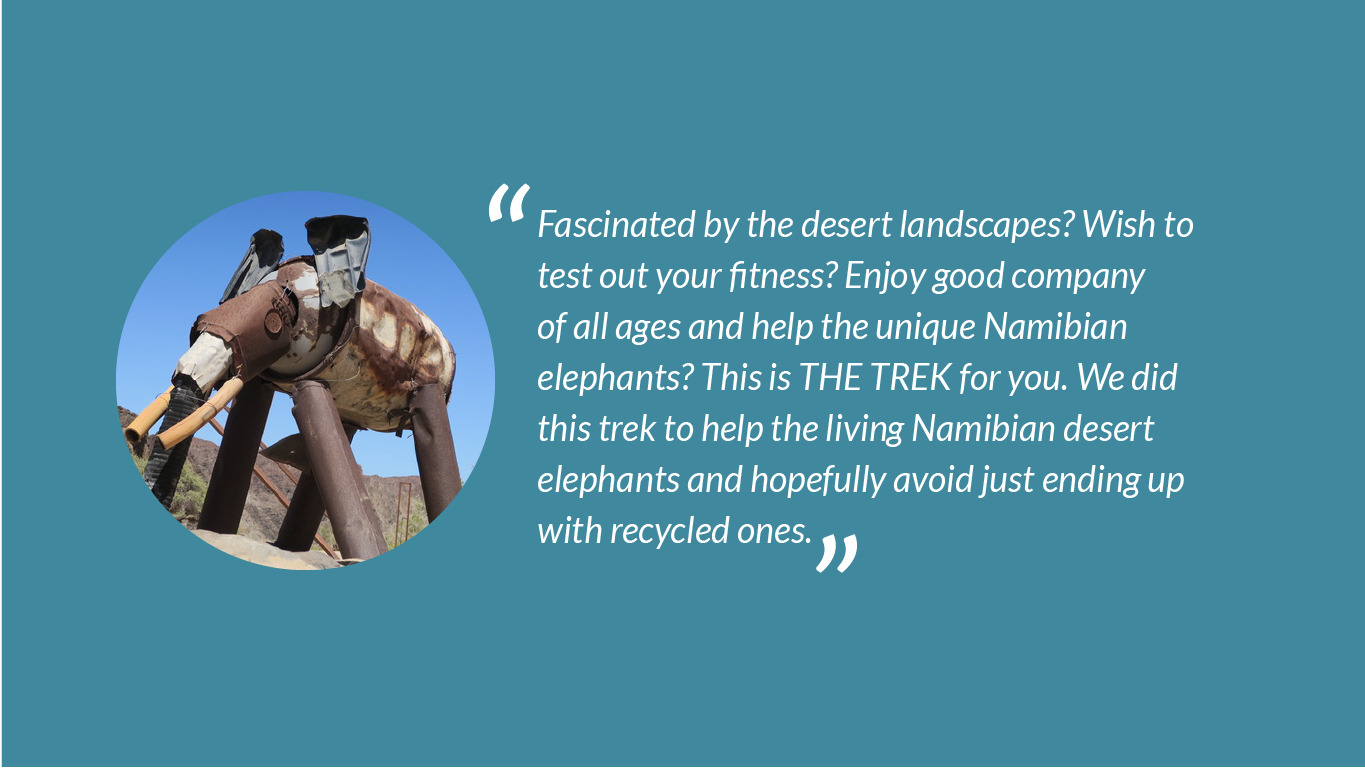Ready for an adventure?
Lets talk.
Join EHRA team members on our annual trek route, hiking 100km over 5 days to raise funds for our conflict prevention programs. Our projects include an elephant corridor initiative, a waterpoint protection project and solar pump installations, elephant tracking patrols, our elephant guards, and our community elephant education initiatives, the PEACE (People and Elephants Co-exist Peacefully) Project and the SEED Project. Through committing to this challenge, you can make a real difference by helping EHRA secure a future where Namibia’s elephants can live in harmony with local communities. In return, we promise you a week you will remember for the rest of your life!
EHRA exists solely to conserve the free-roaming desert elephants and to ensure the safety and security of the communities that live alongside them, and your donation goes directly to the cause.
To read about how former EHRA hikers and volunteers have enjoyed the experience, please check out our blog.
Project Details
13-20 September 2026
5 days
100km
7 - 20 people
Minimum age: 18 years old
Tented and/or outdoor camping
Southern Kunene region, Namibia
All meals included
Camp fire - any dietary requirements are catered for
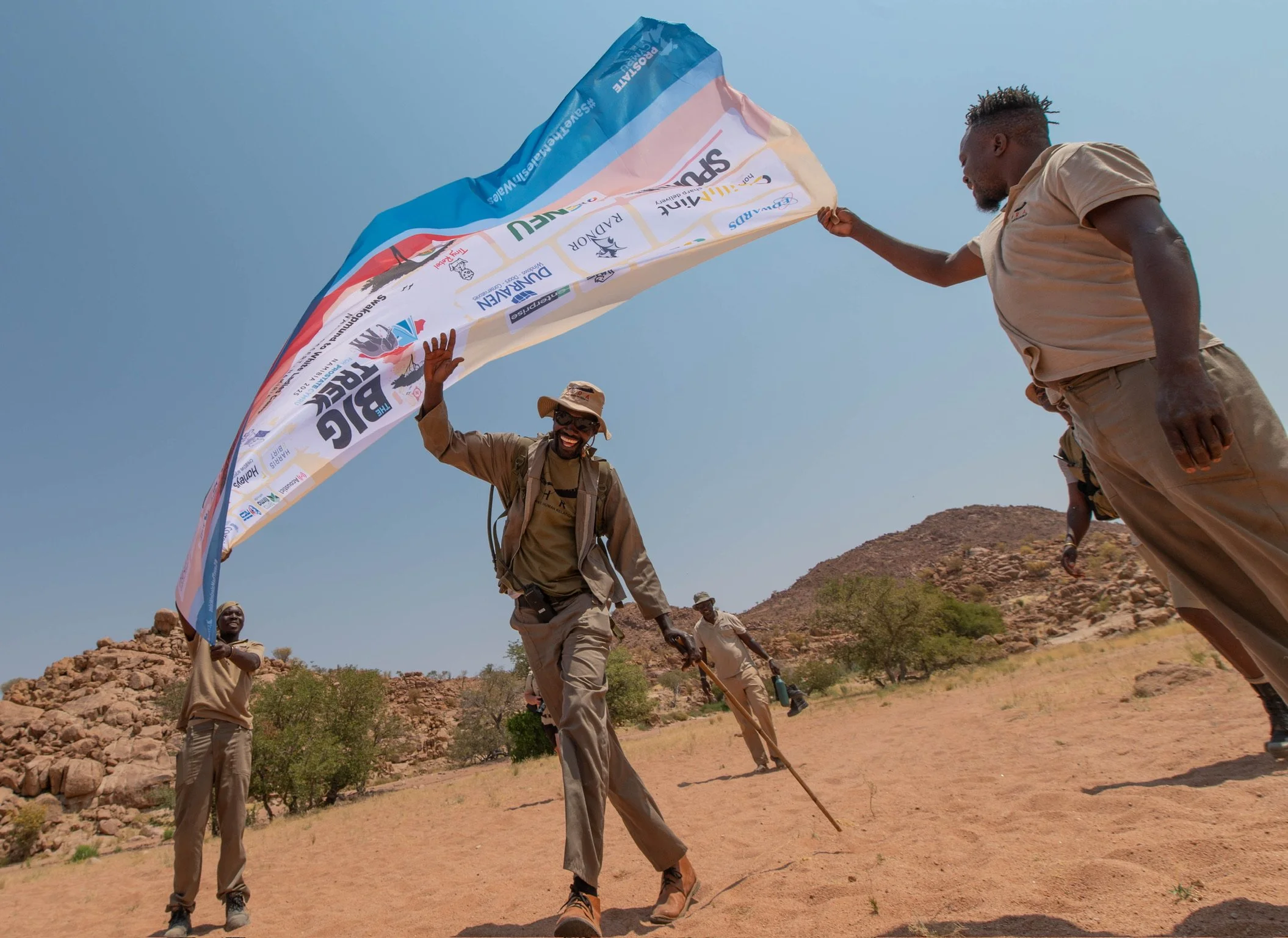
WHY THIS EXPERIENCE IS SO SPECIAL
In celebration of EHRA’s 20th anniversary, marking two decades of dedicated efforts to foster peaceful coexistence between elephants and humans, we are embarking on an extraordinary journey—a 100km trek across the elephants’ natural habitat.
The five-day adventure kicks off at the western base of Namibia’s towering Brandberg, the highest mountain in the country. Our path winds through the foothills of this majestic mountain, leading us to the Ugab River, where desert-adapted elephants roam.
Depending on the elephants’ movements, our journey may take us through the river or along tracks on its banks. Throughout this expedition, the EHRA team will share invaluable insights into the elephants’ lives—detailing family histories, individual personalities, and the extensive measures EHRA employs to safeguard them. Participants will also acquire tracking skills and learn to identify various animal prints. Our ultimate aim is to reach EHRA’s base camp by sunset on Friday!
As we traverse the Ugab River Valley, reveling in some of Namibia’s most breathtaking views, there’s a chance to encounter other wildlife inhabitants, including black rhinos, giraffes, springboks, kudus, oryx, jackals, ostriches, and a myriad of bird species.
Crafted with accessibility in mind, The trek accommodates anyone with a reasonable level of fitness and some prior walking training. Our dedicated backup team will handle the logistics—transporting your luggage, setting up camp daily, and preparing delicious meals over the crackling campfire.
All you have to do is immerse yourself in the experience and enjoy the journey!Feedback from previous walkers tells us that the EHRA is one of the best experiences of your life! Read about Cailin Human’s fundraising experience on our blog here.

ABOUT NAMIBIA
EHRA is one of the only organisations focusing on human-wildlife conflict mitigation, and we believe it is possible for both to coexist amicably. The majority of the work that we do is concentrated in the North West region of Namibia, known as the Southern Kunene region, which is considered one of the most stunning areas in the world. Its free-roaming desert elephants are among the most special wildlife you will ever see, and their ability to survive in the harsh conditions of the Namib Desert showcase nature at its best. Namibia is a beautiful and friendly country, which is easy to navigate and well worth exploring. Most volunteers have chosen to go on a self-drive tour around Namibia whilst they are here, and we can also help you with these arrangements. We hope you choose to join us in the desert, a place where your mind can expand with an abundance of space and heart grows a special tie to Africa!
Questions?
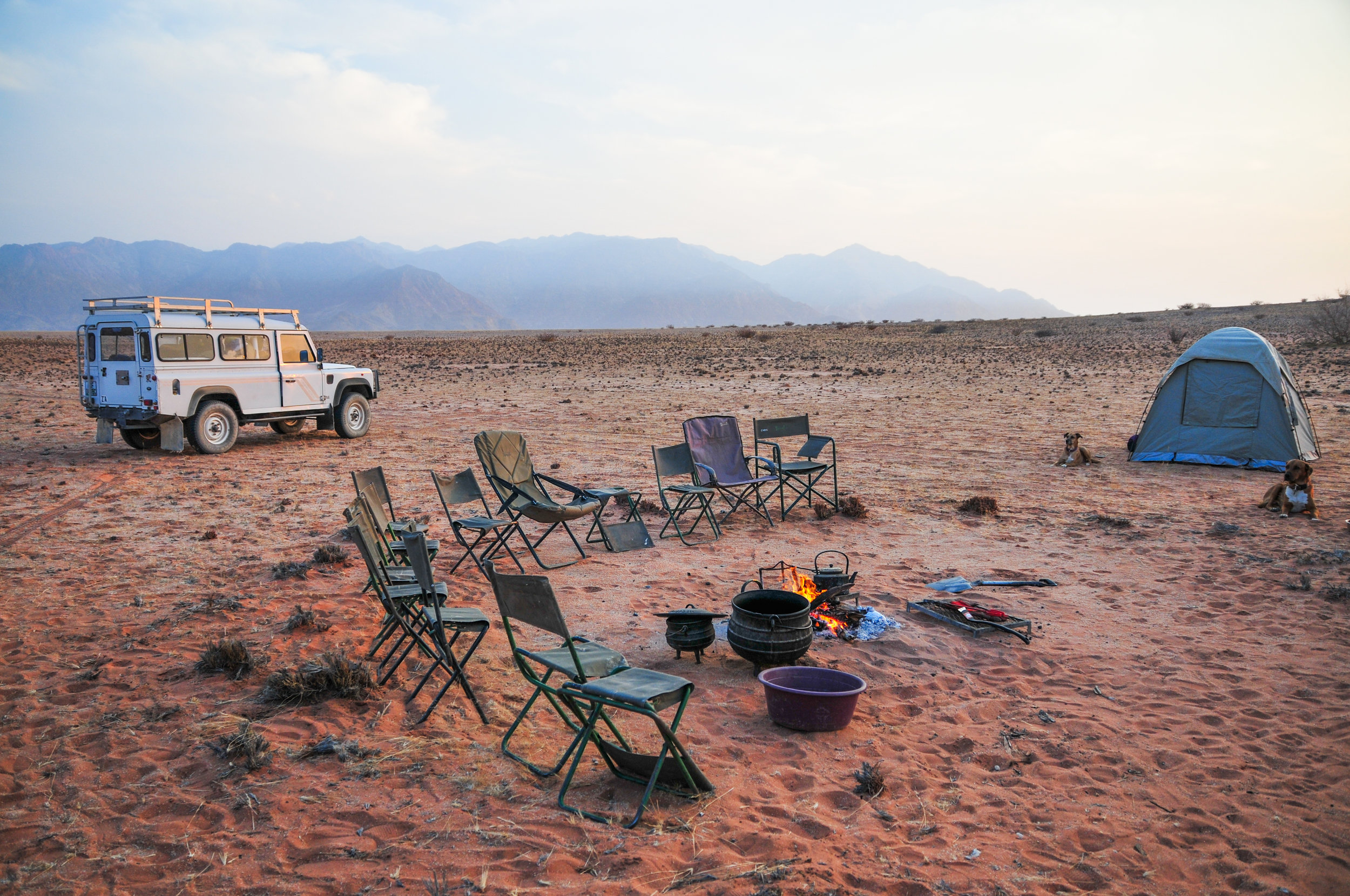
DETAILED ITINERARY
You will need to arrive at the Skeleton Coast town of Swakopmund at the latest by the Sunday before your departure for the trek so that you are in time for the early evening briefing. Getting to Swakopmund from the airport of your choice is very easy and EHRA will organise a door-to-door service from the airport to your accommodation for you.
The route of the trek starts near Ugab Wilderness Camp at the foothills of the stunning Brandberg Mountain Range and leads in a north-westerly direction into the sand dunes, and further towards Doros Crater. From there it swings west to Klein Gai-Ais, from where it turns south to end at the Ugab River. The total distance is a measured 140km. There is the opportunity to join an EHRA elephant tracking patrol with other volunteers at the end of the trek, or we can help you plan an adventure to explore the rest of Namibia.
+ Day 1
Our departure from the coastal town of Swakopmund is scheduled for 10 am. The approximately four-hour drive to the trek’s starting point includes a leisurely lunch stop en route. Anticipate arriving at our campsite in the late afternoon, which will be close to the famous Brandberg mountain which is the dried core of an ancient extinct volcano.
Geology enthusiasts will find this area particularly captivating, with its association with the famous desert plant Welwitschia mirabilis. The landscape bears witness to ancient Bushman habitation, and our guides will weave tales of the area’s rich history as we explore.
+ Day 2 - total distance of 18km
An early start is on the agenda, with the aim of hitting the hiking trail as soon as possible to take advantage of the morning’s cooler temperatures. Although September daytime temperatures are generally mild, warming up as the day progresses, we expect not to exceed 30°C at the peak of the day’s heat.
Our route gracefully winds through the foothills of the Brandberg as we circumnavigate the mountain. This region is renowned for desert black rhinos, prompting our vigilant guides to keep an eye out for any fresh tracks. Despite the seemingly dormant nature of this desert area, your guides will reveal the intricate web of life sustained by many species of desert-adapted plants, insects, birds, and mammals.
After covering 9 kilometers, we’ll pause for a well-deserved lunch break in the Numas River, where the backup team will be ready to assist. Along the way, designated water stops are planned, and each participant should carry a supply of 3 liters (a detailed kit list will be provided).
The afternoon leg of our journey involves another 9 kilometers, leading us to our evening campsite nestled in the sandy embrace of the Numas Gorge.
As the day winds down and depending on the lunar phase, an engaging talk about the night skies may be on the agenda after dinner—a perfect opportunity to marvel at the celestial wonders above.
+ Day 3 - total distance of 21km
Yet another early start beckons as we set out to conquer a 13-kilometer stretch before the lunchtime bell rings! Our journey guides us over undulating terrain, firm underfoot, until we reach the Naib River, where a well-deserved lunch awaits.
During the midday break, Chris will teach about map reading and orientation. In the afternoon, our trajectory points us towards the Ugab, and we remain vigilant in the black rhino territory, carefully scanning for any signs of fresh tracks. The ensuing 8km afternoon walk takes us along a drainage line emerging from a valley in the Brandberg, eventually connecting with the mighty Ugab River.
To round off the day’s adventures, Rachel will entertain us with a captivating talk, delving into the early days of EHRA!
+ Day 4 - total distance 18km
Today we will follow a valley carved through shallow rolling hills and meet the team on a plain where lunch and shade will be set up for our 2-hour rest. As we enter the primary homerange of the Ugab West desert elephant herds in the winter months, the team will have already assessed any elephant movements. With a total population of just 21, this group has reached an ‘unviable’ status. During our lunch break, the EHRA team will provide insights into the current status and challenges faced by this elephant population.
After lunch, our journey takes us back up to the foothills of the mountains, an enchanting 8km walk with the river valley unfolding below. Our camp, nestled between rocky outcrops, offers a view that will be etched in your memory.
Tonight, EHRA team members will share insights into the conservation projects they champion, covering initiatives such as the new SEED Project, the PEACE Project, and our new Elephant Corridor initiative.
+ Day 5 - total distance 25km
Today marks the grand event – a formidable distance to conquer!
The terrain ahead is relatively flat, but will also include some sand underfoot at some points. Our path closely follows the course of the Ugab River, and we will be on the keen lookout for the elephants.
The morning leg of our journey covers the majority of the day’s total, a robust 16 kilometers, followed by a 9km trek in the afternoon. Our midday break will again be will be a serene affair, nestled under the shade of trees along the river.
As the day unfolds, we’ll traverse captivating scenery, drawing near the village of Anixab, renowned for its striking outcrops resembling carefully stacked round rocks.
Tonight’s camp finds its spot in an ancient Bushman camp hunting ground, offering a captivating view of a wetland in the Ugab River. Here, remnants of the past are often discovered, where Rachel even found an ancient ostrich shell bead. In the evening a visitor will talk to us about the fascinating history of the area and the indigenous people.
+ Day 6 - total distance 18km
It’s our final day – a bittersweet occasion! Starting from our camp, we’ll delicately descend into the river. Along today’s hike, we’ll have the privilege of meeting community members whom EHRA has supported over the years. Our first stop is A. Gariseb Primary School, EHRA’s primary partner school, where our contributions have ranged from facility renovations to providing learning resources, mattresses, blankets, washing machines, playgrounds, and more! EHRA volunteers also sponsor the village children to enjoy three meals a day at the school hostel. With 450 children attending, all residing on farms prone to elephant visits, this project holds special significance, as the elephants often roam through the school grounds.
Lunch will once more be in the soothing shade of trees. In the afternoon, we’ll explore some of EHRA’s accomplished projects, from protection walls to solar pump installations. Engaging with farmers, we’ll hear firsthand about their experiences living alongside elephants.
Our goal is to reach the EHRA base camp by sunset, with the final stretch leading us through a beautiful natural spring, offering an opportunity to put our tracking knowledge to the test.
Upon arrival, the entire EHRA team will extend a warm welcome. A celebratory sundown awaits us atop the cliffs at camp, where we’ll witness the sunset over the Brandberg Mountain, marking the spot where our journey commenced.
Tonight we will celebrate with a great meal and some fun entertainment!
+ Day 7 - Departure
Following a relaxed morning wake-up and breakfast, our journey concludes as we make our way back to the coastal town of Swakopmund.
For those seeking more adventure, an enticing option awaits – extend your stay at the camp and join the EHRA patrol for an additional 4 days of camping and elephant tracking, this time from the comfort of a vehicle. Alternatively, if time is of the essence or if you’re eager to explore more of Namibia, we’re here to help tailor a shorter trip or assist in arranging further travel.
You are most welcome to contact a member of the EHRA team if you have any questions.
Project Location


DATES AND COSTS
2026’s Trek will take place from 13 - 20 September. The amount to fundraise to participate in the trek is GBP 2500. This includes return transfers from Swakopmund to the trek starting point, food and camping equipment whilst on the trek. If you would like to fundraise for EHRA then support is available through sponsorship forms and fundraising ideas. Once you sign up for the trek, you will be sent a pack full of ideas, a kit list and training advice to help prepare you for the challenge. Your fundraising efforts will provide much needed support for the conservation of the Namibian desert-adapted elephants and provide sustainable solutions to the challenges encountered by the people living alongside them.
*Your transfer from Walvis Bay Airport to Swakopmund is N$350 or N$620 from Windhoek Airport. There are lots of accommodation options to suit all budgets in Swakopmund, ask us for more information. *Rates may change without notice.
Ready to book?
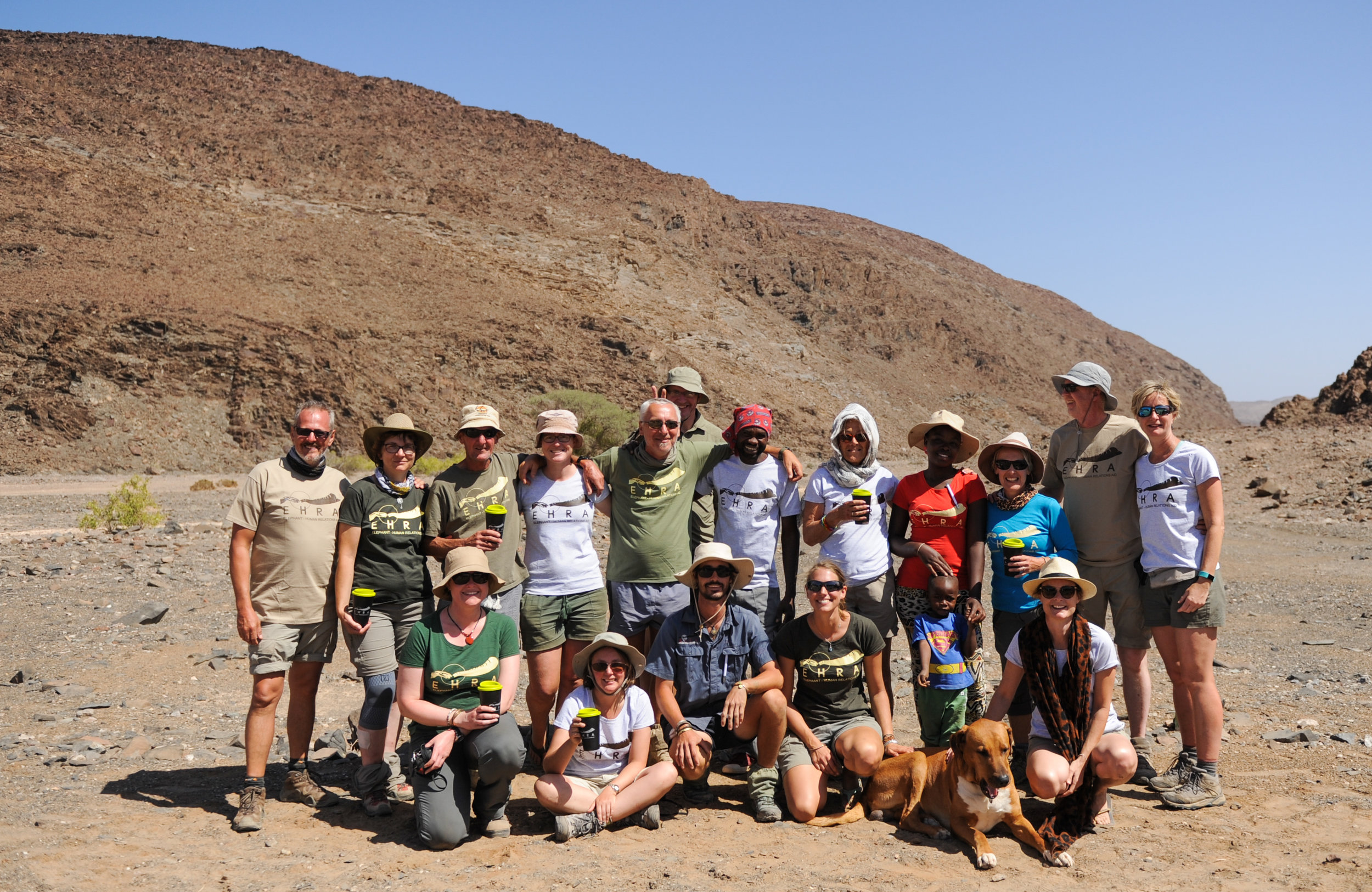
FURTHER INFORMATION
+ Living Conditions
You will be camping for the duration of your trek sleeping on mattresses in tents.
This is wild camping so there are no shower or toilet facilities during your time in the desert.
+ Transfers & Accommodation
Once you have booked your flight, please send us the details and we will book the transfers for you. For both airports you will be met in arrivals by our transfer service and driven to either Desert Sky Backpackers in Swakopmund or to your accommodation of choice. Airport transfers and accommodation in Swakopmund are at your own cost.
*Your transfer from Walvis Bay Airport to Swakopmund is N$350 (one-way) or N$620 from Windhoek Airport. Desert Sky Backpackers will cost you N$220 for a dorm bed or N$450 for a single room.
*Rates may change without notice.
+ Dietary Requirements
Please let us know if you have any dietary requirements including food sensitivities. We can accommodate varying needs including vegetarians and gluten or lactose intolerance.
+ Flights
You have the choice of two airports to fly into. Windhoek International Airport in Namibia’s capital city and Walvis Bay Airport on the coast.
Windhoek is a five-hour drive from Swakopmund, so please arrive by 12 noon on the Sunday at the latest so that you can catch the scheduled shuttle service through to Swakopmund on the same day.
Walvis Bay is just a 30-minute transfer to Swakopmund. This is a much easier journey although flights are often cheaper into Windhoek.
When booking your return flight, please ensure that you are not flying any earlier than 2pm on the Saturday following your trek.
+ What to Bring
This information is available to view and print from our Info Kits.
Still have questions?

Ready for an adventure? Let’s talk!
